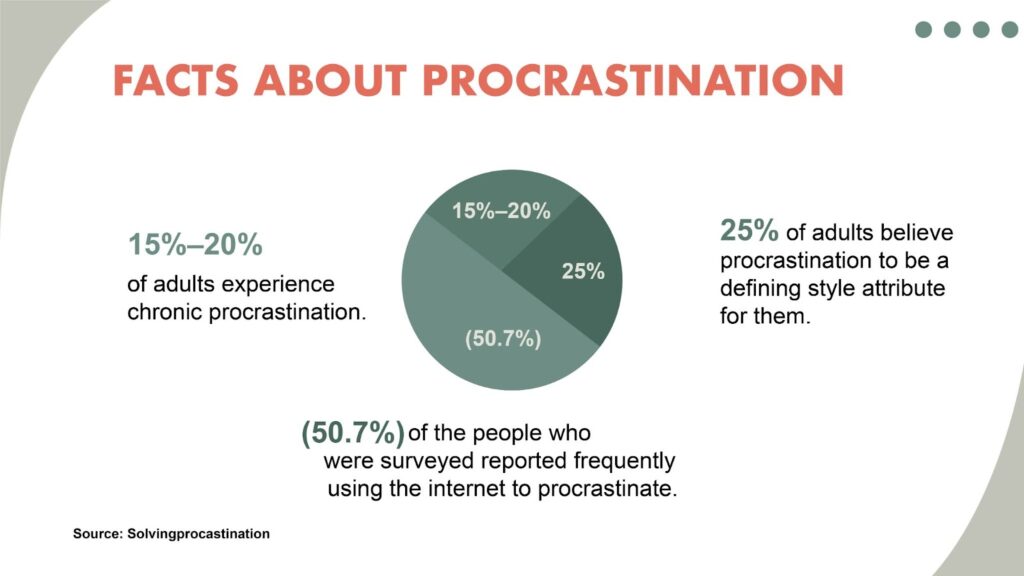Despite our best intentions, we often find excuses to put off completing a task. We might give more priority to tasks that we can complete quickly, and put off the more difficult tasks for another day. While deftly avoiding the activities that actually matter, we might appear to be busy and feel occupied. And we can’t help but feel a bit let down by ourselves when we see those rolling, unfinished tasks at the bottom of our to-do list. According to studies, 15%–20% of adults experience chronic procrastination, and 25% of adults believe procrastination to be a defining style attribute for them.
But here is the main question: How do you stop being so narrow-minded about your difficult tasks?
Revamping the cost-benefit analysis is key; the advantages of action should outweigh the costs of action. In other words, completing a burdensome task must feel greater than the immediate discomfort of doing it. But how does one achieve it?
We can build this mindset by practicing yoga that restructures our brain and trains our brain muscles.

Why do we Procrastinate in the First Place?
Our minds are not wired to procrastinate, but that is what we still do. Which is a problem. Generally, we all generally find it difficult to complete jobs that provide potential rewards in the future in exchange for the work we put in today. This is so because our brains digest concrete information more quickly than abstract information.
That’s because our brains handle concrete information more easily than abstract information, and the current inconvenience is extremely real in comparison to those unknown, uncertain future rewards. Thus, in our thoughts, the short-term effort easily outweighs the long-term benefits, which is an instance of what behavioral scientists refer to as present bias.
5 Remarkable Ways To Stop Procrastinating With Yoga
One of the most important pieces of advice while practicing yoga is that putting off spiritual growth is extremely harmful. Try utilizing these 6 strategies to quit putting off tasks.
1 Consider The Abundance Of Life
Stop concentrating on what you have and what you dont. Instead, make the most of what you already have while being willing to take risks that could result in bigger discoveries. Because when you have the option to keep trying, you will never run out of possibilities.
2 Be Truthful
Staying true to yourself is the most effective strategy taught by yoga. You will undoubtedly lose your one-legged balance when your mind is racing in a million other directions. Realize that you are procrastinating and strive to overcome it.
Continue to put in your best, most sincere effort, and don’t give up when things get challenging.
3 Visualize Yourself
Researchers have shown that when people see themselves digitally aged, they are more inclined to start saving for their retirement. Why? Because it makes them feel more like their future selves, which makes the rewards of saving seem more substantial. By taking a moment to create a clear mental image of the advantages of completing any activity we’ve been putting off, we may use a low-tech adaptation of this strategy to help us get things done.
So, if you’re putting off making a call or sending an email, encourage your brain by visualizing the moral gratification you’ll feel after it’s over. You may also picture the person’s face when they receive what they needed from you.
4 Pre-commit Openly
Our brain’s reward system is so sensitive to our social standing, that saying we’re going to do something can significantly increase the attraction of actually doing it. Most of us don’t want to come across as stupid or lazy to others. In order to follow through on our commitment, we can add social advantages by daring to declare, “I’ll send you the report before the end of the day.” This incentive may be just enough to get us to bite the bullet.
5 Face The Consequences Of Inaction
According to research, people have an odd aversion to accurately analyzing the status quo. We may analyze the benefits and drawbacks of doing something new, but we do so far less frequently when considering the alternatives. This is known as omission bias, and it frequently causes us to overlook clear advantages of doing new things.
Consider that you keep putting off the work that needs to be done in advance of a meeting. You persuade yourself that you’ll finish it tomorrow since you’re enticed by more interesting tasks (or the day after). But when you make yourself consider the consequences of delaying, you realize that it will be too late to contact your colleagues in order to acquire the advice you actually need. Finally, your gears begin to clunk into motion because if you get rolling right now, you have a chance of getting there in time.
To feel as though the costs of conduct are lower:
- Decide on the Initial Action. Sometimes we simply avoid a chore because we are too afraid to do it. Even though learning French could be on our list of priorities, who can fit that into the normal person’s schedule? Here, it’s important to divide large, ambiguous jobs into smaller, less taxing steps. Finding the smallest possible first step—something so simple that even your current brain can recognize that the rewards outweigh the costs of effort. If you accomplish that modest goal, you’ll be more inspired to move on to the next modest step than if you had been berating yourself for your limited language proficiency.
- Eliminate The Hidden Blockage: Sometimes, despite our repeated attempts, we find ourselves unable to start a task. We now need to find out what is actually making taking action undesirable by asking that voice some questions. Psychotherapy isn’t necessarily necessary for this. The obstacle can emerge very fast if you patiently ask yourself a few “why” questions, such as “why does it feel tough to do this?” and “why’s that? A perfectly good competing commitment is frequently the problem since it interferes with your motivation. Let’s say, for instance, that you were having trouble maintaining a morning goal-setting habit. The difficulty is caused by your equally powerful desire to have breakfast with your family, as a few “whys” might demonstrate. It’s much more likely to occur if you’ve made that conflict clear. It’s much more likely that you’ll discover a solution once you’ve made that issue clear—possibly by setting your attainable goals the previous evening or during your drive to work.
Why Our Yoga Courses Are Best To Beat Procrastination?
It helps with a variety of techniques that can lessen the hesitancy and delay that obstruct development, as well as other yoga sessions for self-esteem, productivity, attention, and letting go of stress.
Yoga is a practical method that everyone may use to learn how to quit procrastinating. It is also a reliable gauge of self-control. Make the time, make the commitment, and show up for yourself without postponing it. By showing up every day, we weaken procrastination’s hold over us while also strengthening the mind.
